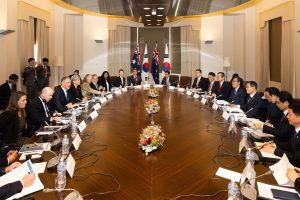South Korea is considering sharing advanced military technology with the United States, the United Kingdom and Australia through the so-called AUKUS partnership, South Korean Defense Minister Shin Won-sik said.
Shin said the possibility was discussed during two days of meetings between South Korea and Australia’s defense and foreign ministers, also known as a 2+2 meeting, that ended in the Australian city of Melbourne on Wednesday.
The United States and the United Kingdom agreed in 2021 to provide Australia with a fleet of submarines powered by U.S. nuclear technology under the AUKUS agreement to counter a growing military presence from China. AUKUS is an acronym for Australia, the United Kingdom, and the United States.
AUKUS Pillar II involves cooperation on a wider range of security technologies including artificial intelligence, electronic warfare, and hypersonic systems. This aspect of the AUKUS partnership opens the door to participation by other U.S. allies – including South Korea.
Shin welcomed South Korea’s invitation from the three AUKUS partners.
“We do welcome that AUKUS members are considering Korea as an AUKUS Pillar II partner and Korea’s defense science and technology capabilities will contribute to the peace and stability of the development of AUKUS Pillar II and regional peace,” Shin said through a translator.
Japan is also moving toward formal talks to become part of AUKUS Pillar II’s technology development and sharing. However, the central role of nuclear technology in AUKUS has made signing on to Pillar II of the agreement a sensitive topic for the Japanese government.
New Zealand’s government has shown interest in joining Pillar II as well, although no commitments have been made. Critics have said participation in the grouping would violate Wellington’s proud nuclear-free policy.
Australian Defense Minister Richard Marles spoke warmly of South Korea and Australia’s efforts to strengthen their existing alliances with the United States. He also welcomed South Korean efforts to build on its relationship with Japan, which along with Australia, the United States, and India form a security dialogue known as the Quad.
“We see this is a very, very positive step forward in the strategic landscape of the region and represents a huge opportunity for Australia to engage with both Korea and Japan,” Marles told reporters.
The readout from the 2+2 meeting recognized that “growing strategic alignment [between South Korea and Australia] supported enhanced defense cooperation both bilaterally and with like-minded partners to maintain peace and stability in the Indo-Pacific, as well as on the Korean Peninsula.”
“Korea and Australia are working together to uphold the rules-based order within our region and, in fact, within the world,” Marles added.
































